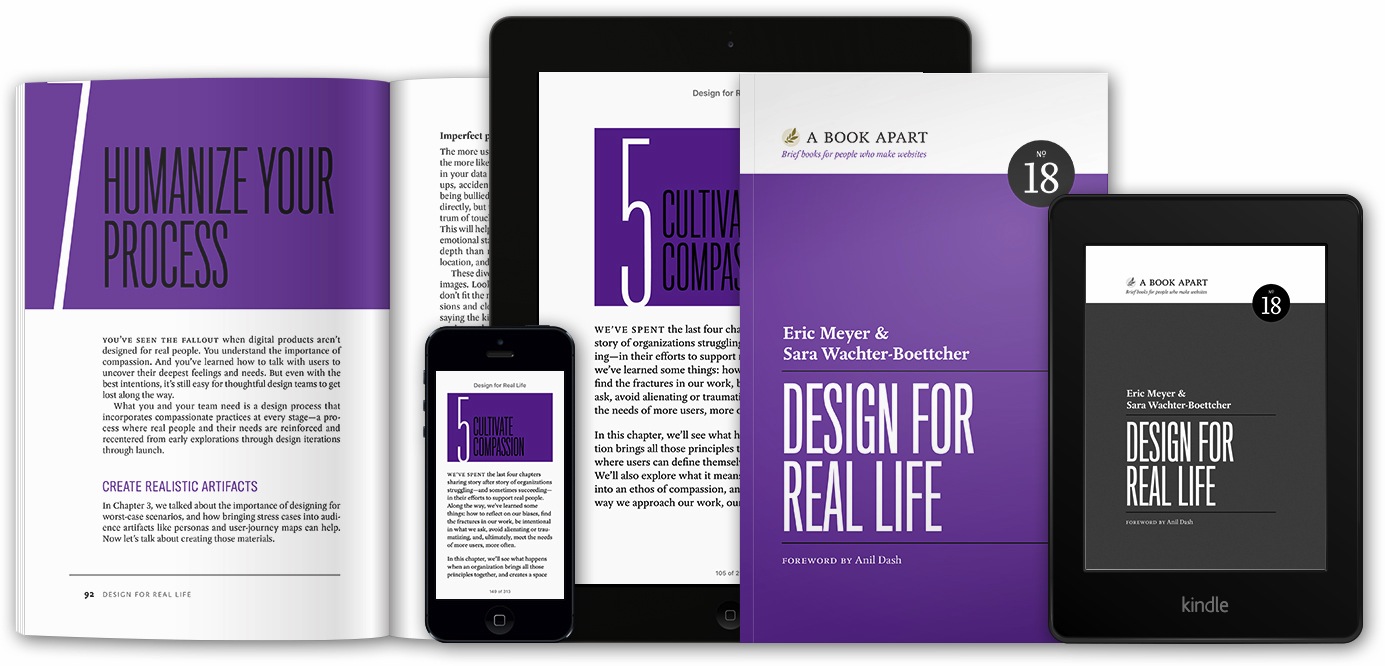
Available as of this morning from A Book Apart in both digital and paper formats: Design for Real Life, the book Sara Wachter-Boettcher and I started writing not quite a year ago.
Anil Dash was kind enough to write a wonderful foreword for the book, in which he perfectly describes the background we were working against:
Two billion people now have some kind of access to internet technologies, and almost all of them are spending more and more time with their thumbs flicking across their phones. And the technology they’re using has a real impact on their lives. They don’t use an app to “share photos”; they use it to maintain a relationship with distant family. They don’t need to do “online banking”; they need to lend a friend money to help them out of a jam. Nobody wants to learn a complicated set of privacy controls; they just want to be able to express themselves without antagonizing bosses or in-laws.
Our thesis, against that, was to say, “As personal and digital lives become closer and effectively merge, the things we design will have to work harder and harder to deal with real people in all their messy complexity. How can we start people thinking about this, and what tools can we give them?” That’s what we strove to create, and now you can judge for yourself whether we succeeded.
I’ll be honest: we were pretty scared as we wrote it. This is not a topic area that’s gotten a ton of attention, and in a lot of ways we were breaking new ground — but, at the same time, we were very aware that there was existing research and knowledge in related areas, so we wanted to be sure we were inclusive or, and respectful of, that work. We talked to a lot of people in a variety of disciplines, trying to make sure we brought in information that would help the reader and not flying in the face of things that were already known.
So you can imagine our relief and gratitude as we’ve heard glowing reactions from people who read preview drafts — among them Kim Goodwin, Indi Young, Sara Soueidan, Caren Litherland, and Karen McGrane. Paul Ford said, “Anyone who aspires to build global products that people love should read this book now,” and Kate Kiefer Lee said, “It will be required reading on my team.”
You might think cover blurbs like those are pure marketing fluff, and maybe in some genres they are. For us, they serve double duty: to let you know that people who know what they’re talking about believe we know what we’re talking about, and also to let us know that. There were days we weren’t entirely certain.
To be clear, this isn’t a book about forever treating people with kid gloves. We say “compassion isn’t coddling”, and that’s absolutely the case. An error message still needs to convey the error; an account lockout still needs to keep the account locked. But how we convey errors or lockouts, and how we make people aware of the possible ramifications of their actions, is critical. Just as there are good ways and bad ways to commiserate with a grieving friend or handle a difficult work situation, there are good ways and bad ways to approach people in our designs.
As I said before, we need to deal with real people, in all their messy complexity. We hope Design for Real Life is the start of a whole new conversation within our field, one that will teach Sara and me just as much as anyone else about how we can be more thoughtful and humane in what we create.
